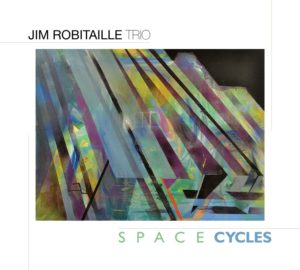 The Jim Robitaille Trio’s latest offering Space Cycles provides a soundtrack for anybody engaged in deep meditation. It is a thinking person’s album, a jazz recording for those who enjoy following a good melody, tight arrangement, and skillful interplay among musicians while having one’s thoughts stimulated by a great deal of activity within a composition.
The Jim Robitaille Trio’s latest offering Space Cycles provides a soundtrack for anybody engaged in deep meditation. It is a thinking person’s album, a jazz recording for those who enjoy following a good melody, tight arrangement, and skillful interplay among musicians while having one’s thoughts stimulated by a great deal of activity within a composition.
Opening cut “Natural Selection” contrasts a thin, nimble electric guitar line with a knobbier, thicker low end line from the bass guitar. The differences in those two textures highlight the sharp snap of the melody line as well as the pushy nudge from the bass. Traveling together, both instruments make a fine progression over a subtle but persistent drum pattern. When the guitar and bass increase tempo and dynamics they spiral their lines in larger webs of interplay. Quite an impression is made on the listener as these players develop this piece into a breathtaking flight of fancy.
Bill Miele‘s assertive bass line comes in with a self assured strut on “Transitions.” Its run of thick notes makes a perfect platform for Robitaille to press out some ringing high notes. That melodic phrase multiplies its number of notes until there is a plumage of bright highs. Notes that dance around the beat in colorful brightness, making way for Miele’s brief but bulbous solo spot. The interplay of instruments here is very exciting.
“When We Passed” finds New Bedford, Massachusetts resident Robitaille pressing out tender, emotive notes. His melodic phrase expresses loss, forlorn hope, and distance. His sensitive picking style here results in notes that fall like tears onto some buoyant bass notes. Chris Poudrier’s elaborate brush work keeps his pattern wide, wide enough to support the expanding lead guitar and bass lines. All three instruments dovetail into one plumage, colors that compile to construct this vision.
Title track “Space Cycles” travels coolly in with quick, light touches of guitar. A palpable rhythm within that guitar melody keeps it lively and interesting. This pattern continues at different tempos, dynamics, and as it widens in melodic sweep, one can truly appreciate all the work that is going on here. As the other players continue to swing around the melody this continues to engage with its ever expanding patterns.
The subtle interplay during a George Forrest, Robert Wright tune titled “Baubles, Bangles, and Beads” is what makes the tune appealing. Its plethora of high notes supported by a wedge of low end notes makes it easy to picture the guitar and bass as polite travel companions. Chris Poudrier moves it along with a quietly swinging drum approach, his looseness creating a wide pattern for supporting the subtle shifts in dynamics and tempos above. His eventual solo spot allows him room to expand on the juicy freeness of his stick work, a pattern requiring discipline as well as a feel for what technique alone cannot explain.
Robitaille presses out more heavily accented notes on “February 12.” His interval of notes assert themselves well as their sharpness make them fit together in a beautiful, seamless run. The Bill Miele low end accompaniment provides a wedge of thickness beneath the guitar. This bass work travels as freely and beautifully as the guitar line while having the perfect density to support it.
Bits of brittle, dark guitar notes pull one into the eerie atmosphere of “Nocturne.” This one could be about walking under a moonless night or about walking on the surface of the moon. Its sublime electric guitar line remains thin, emotive, and a bit hectic. As the three players expand their phrases, the feeling intensifies and both the quiet beauty of the night as well as the potential for the mystery and the danger of the night are present.
A revision of the Julie Styne, Betty Comden, and Adolph Green tune “Never Never Land” takes this album to a gentler place. With an acoustic guitar leading the way, this tune, heartfelt and tender, feels like a parent’s whisper in the ear of its child. The gently picked acoustic notes receive a warm, on time support from the low end. While the acoustic notes snap with accented picking, the low end, docile in the backdrop, makes its presence felt with a warm embrace of the upper register.
Adapting The Beatles’ tune “Here, There and Everywhere” to his understated jazz guitar couldn’t have been easy. Yet, Robitaille makes it all seem easy as the melodic line is precise,. ringing out on the strength of the sharply accented notes, a melody that belongs to yesteryear while sounding fresh and new within this rendition.
Close out track “Chance Meeting” begins with a spread of drum fills, multiple little skin smacks cascading, turning over to usher in more of the guitar and bass innovation that highlights this album. Vigorous fretwork backed by nudges of thumpy bass and intricate work at the drum set are this trio‘s trademarks. When these musicians expand on the central interplay, the wider sounds fills the space with colorful fireworks. Miele’s bass plucking fits together with Robitaille’s electric guitar like two parts of the same machinery that need to be fastened together for the big machine to work.
Robitaille, Miele, and Poudrier have come up with very good stuff on this Space Cycles album. On the Whaling City Sound label, its precision and technique should prove interesting to those even outside of the jazz world. There is much to be admired among these well architected and well performed pieces.

